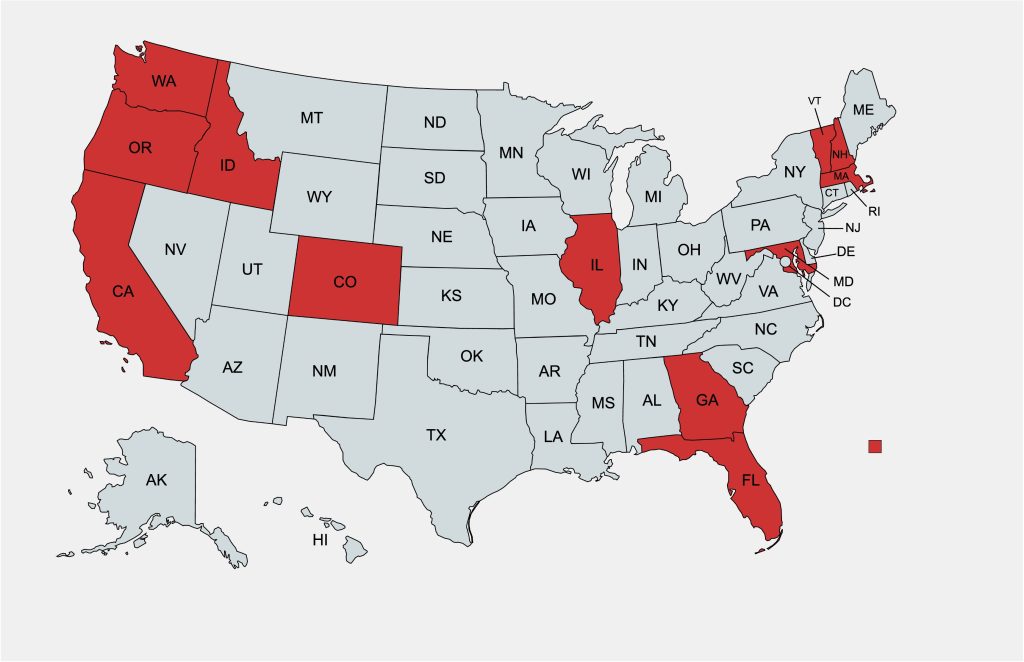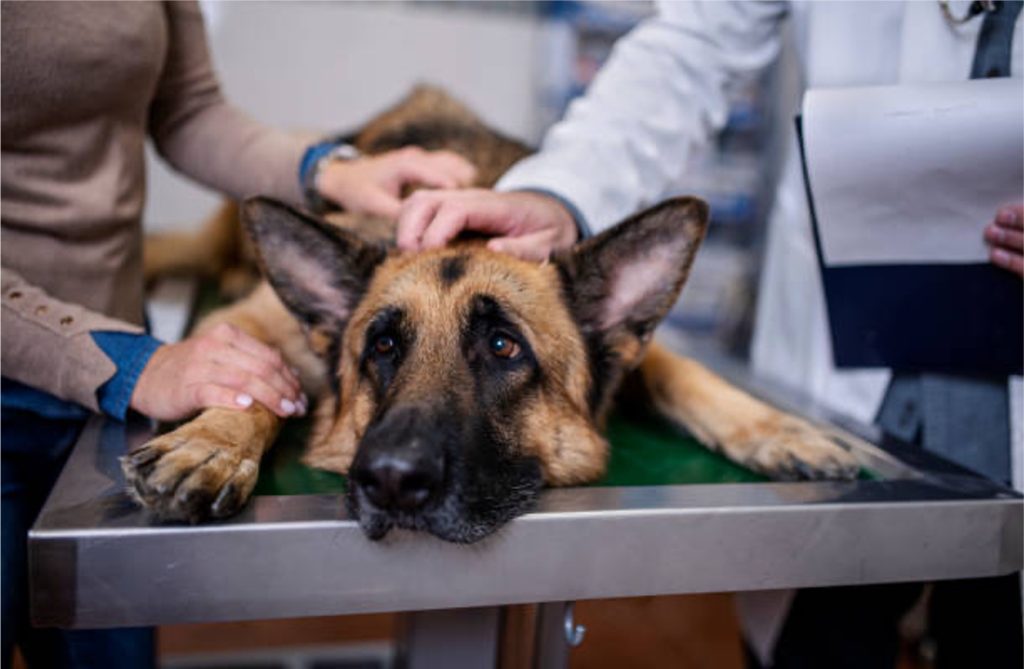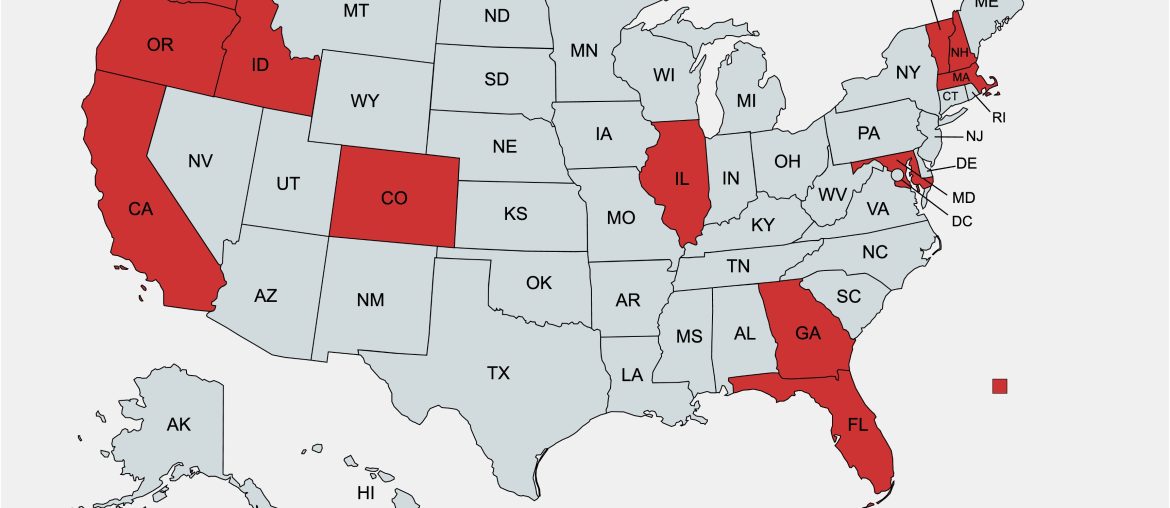The mysterious dog illness has now been confirmed in 14 states according to the American Veterinary Medical Association (AVMA). The confirmed states with the mysterious dog illness are (see map below):

- California
- Colorado
- Florida
- Georgia
- Idaho
- Illinois
- Indiana
- Maryland
- Massachusetts
- New Hampshire
- Oregon
- Rhode Island
- Vermont
- Washington
Dr David B. Needle, a pathologist at the New Hampshire Veterinary Diagnostic Laboratory and a clinical associate professor at the University of New Hampshire, along with his research team, have been unable to link this illness to any known canine respiratory diseases.
The team’s early metagenomic analysis failed to identify any typical RNA or DNA viruses, fungi, or bacterial pathogens that usually cause respiratory issues in dogs. Since mid-August, over 200 cases have been reported in Oregon alone, according to the American Veterinary Medical Association.
Recent Developments – ‘funky bacterium’ likely pathogen
In a recent development, researchers from New Hampshire have identified a new type of bacterial infection that may be responsible for a mysterious respiratory illness impacting dogs nationwide. This revelation came from the New Hampshire Veterinary Diagnostic Laboratory, where genetic sequencing was performed on samples from 70 dogs affected in New Hampshire, Rhode Island, and Massachusetts, uncovering a bacterium that has not been seen before.
Dr. David Needle, a key researcher in this study and the pathology section chief at the University of New Hampshire College of Life Sciences and Agriculture, shared his findings in an interview with CBS News.
Describing the bacteria, Dr. Needle referred to it as a “funky bacterium.” He elaborated on its unique characteristics, noting, “It’s smaller than a normal bacterium in its size and in the size of its genome. Long story short, it’s a weird bacterium that can be tough to find and sequence.”
Dr. Needle further explained the significance of this discovery in understanding canine health. He said, “The germ is new as a potential cause of disease, but it is likely to be— or to have evolved from — a component of the dog microbiome.”
Having said that, an article published by the Colorado State University College of Veterinary Medicine and Biomedical Sciences suggested that the pathogen may be a combination of both viral and bacteria infections: “Clinical findings and tests completed to date suggests that most dogs with the unusual syndrome have a virus that primarily targets the respiratory system, leading to secondary bacterial infection and pneumonia in affected dogs.”
Described by the Oregon Department of Agriculture as an “atypical canine infectious respiratory disease,” the illness manifests symptoms like coughing, sneezing, discharge from the eyes or nose, and lethargy in affected dogs. Melissa Justice, a veterinarian at the Indiana State Board of Animal Health, informed CNN that most cases resemble kennel cough but do not respond to standard treatments and tend to last longer than the usual duration of seven to ten days.
Justice further detailed that dogs affected by this illness may show signs of lethargy, fever, decreased appetite, productive cough, nasal and ocular discharge, respiratory distress, or even pneumonia.

In response to this escalating health concern, the US Department of Agriculture Animal and Plant Health Inspection Service is stepping in. The department is in collaboration with local agencies and diagnostic laboratories to identify and understand this perplexing disease. The federal government’s involvement underscores the seriousness of this emerging health threat to the canine population.
According to AVMA President Dr. Rena Carlson, over 200 cases have been reported in Oregon since mid-August, and other affected states are yet to declare their numbers. The Oregon Department of Agriculture, along with state and national diagnostic labs, is urgently seeking to identify the pathogen responsible for this outbreak. Veterinarians are advised to report cases immediately, and pet owners are encouraged to consult their vets if their dogs show any signs of illness.
Signs and Symptoms
The Colorado State University College of Veterinary Medicine and Biological Sciences has observed a possible virus linked to severe pneumonia and, in some cases, fatalities. However, the total number of deaths nationwide remains unknown.
The illness manifests as chronic tracheobronchitis, chronic and acute pneumonia, often resistant to antibiotics, and includes symptoms like difficulty breathing, wheezing, dehydration, fever, and weight loss.
Transmission of the disease is not fully understood, but close contact and shared air with infected animals are suspected to be the primary modes. David Needle, a senior veterinary pathologist at the University of New Hampshire’s Veterinary Diagnostic Laboratory, notes that while the illness can be fatal, dogs with pre-existing conditions are most at risk.
Treatment Options
Treatment for the illness is currently supportive, focusing on alleviating symptoms rather than targeting a specific pathogen, as the causative agent remains unidentified. This includes oxygen therapy, nebulizers, antibiotics for secondary infections, and ensuring adequate nutrition and hydration.
The AVMA and other veterinary experts advise dog owners to ensure their pets are fully vaccinated, avoid high-risk areas like dog parks, pet stores, and boarding facilities, and seek immediate veterinary care if respiratory symptoms are observed.
The United States Department of Agriculture continues to support state testing efforts but emphasizes their limited role in the absence of a clear causative agent for the disease.
Some dogs may be of higher risk
Dr. Lisa Lippman, who leads the virtual medicine department at Bond Vet, has been fielding numerous inquiries from worried dog owners, particularly regarding the advisability of boarding their pets. Here are some key takeaways:
- Age: Very young puppies and older dogs often have weaker immune systems, making them more susceptible to infections.
- Pre-existing Health Conditions: Dogs with pre-existing respiratory issues, weakened immune systems, or other chronic health conditions might be at a higher risk.
- Dogs in Congregate Settings: Dogs that are frequently in close contact with other dogs, such as in kennels, shelters, dog parks, or doggy daycare, may have a higher chance of contracting contagious illnesses.
- Breed-specific Vulnerabilities: Some breeds may have predispositions to respiratory issues. For example, brachycephalic breeds (like Bulldogs, Pugs, and Boston Terriers) already have compromised respiratory systems due to their short snouts and could be more affected by respiratory illnesses.
- Unvaccinated Dogs: While it’s unclear if vaccines can prevent this specific illness, dogs that are not up-to-date on their vaccinations may generally be more at risk for various infections.
What can dog owners do?
Veterinary experts from the American Veterinary Medical Association (AVMA) have issued guidelines to help dog owners safeguard their pets.
A key recommendation is to ensure dogs are fully vaccinated, particularly against kennel cough. While these vaccines may not directly combat the unknown infection, they are crucial in bolstering the overall immune system of dogs, providing a general health shield.
Owners are also advised to limit their dogs’ exposure to high-risk areas. This includes avoiding dog parks, pet stores, and grooming facilities as much as possible, to reduce the chances of their pets contracting the highly contagious disease.
Special attention is being drawn to the practice of dog boarding. Experts suggest avoiding boarding dogs unless it’s absolutely necessary. The advice stems from concerns about interstate pet mobility, which could potentially facilitate the spread of the illness.
Furthermore, in cases where dogs exhibit respiratory symptoms – such as coughing, sneezing, or lethargy – owners are urged to contact their veterinarian immediately. It’s also recommended to isolate the affected pet from other animals to prevent further transmission until the issue is resolved.
These precautions are part of a broader effort to contain and understand the mysterious illness, ensuring the health and safety of pets across the country.






